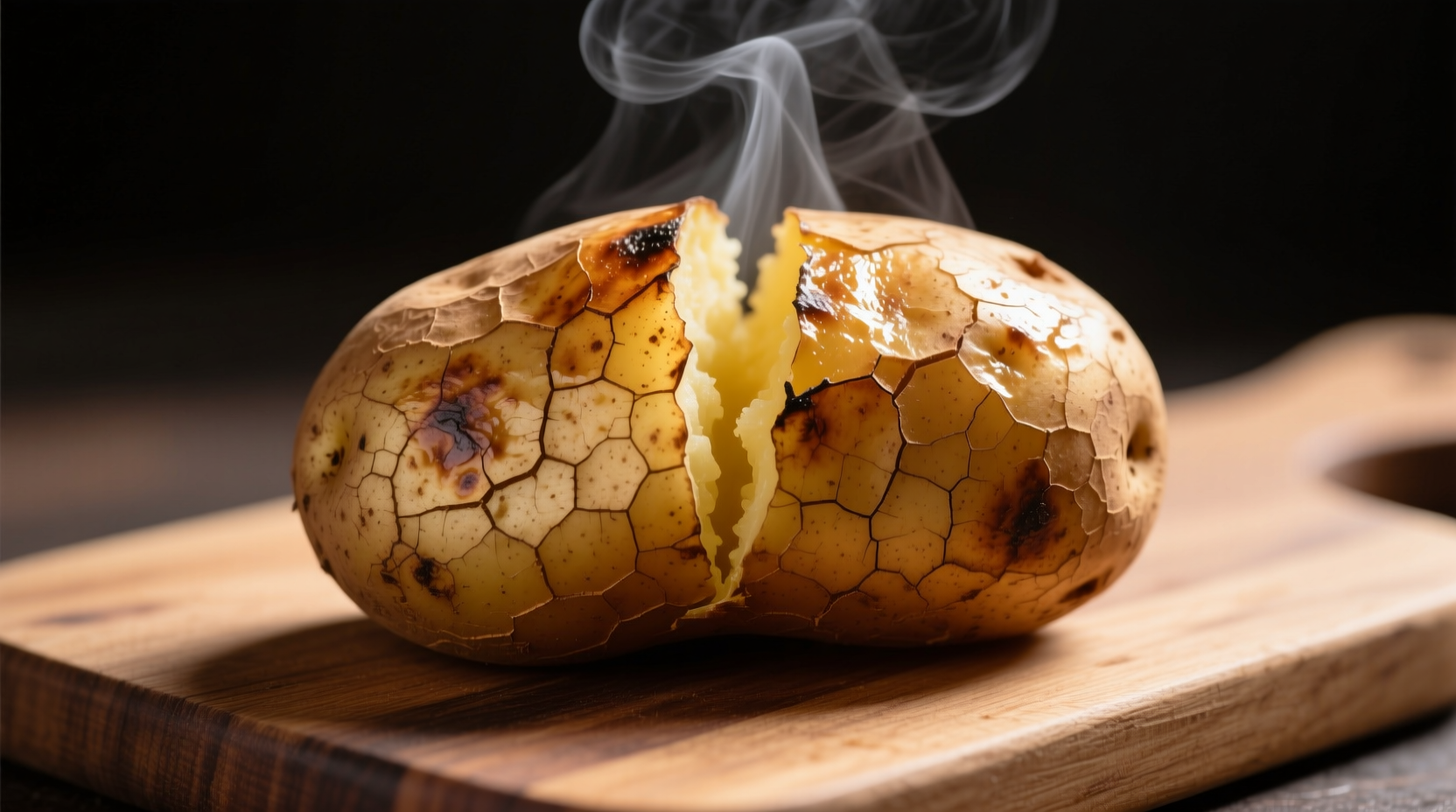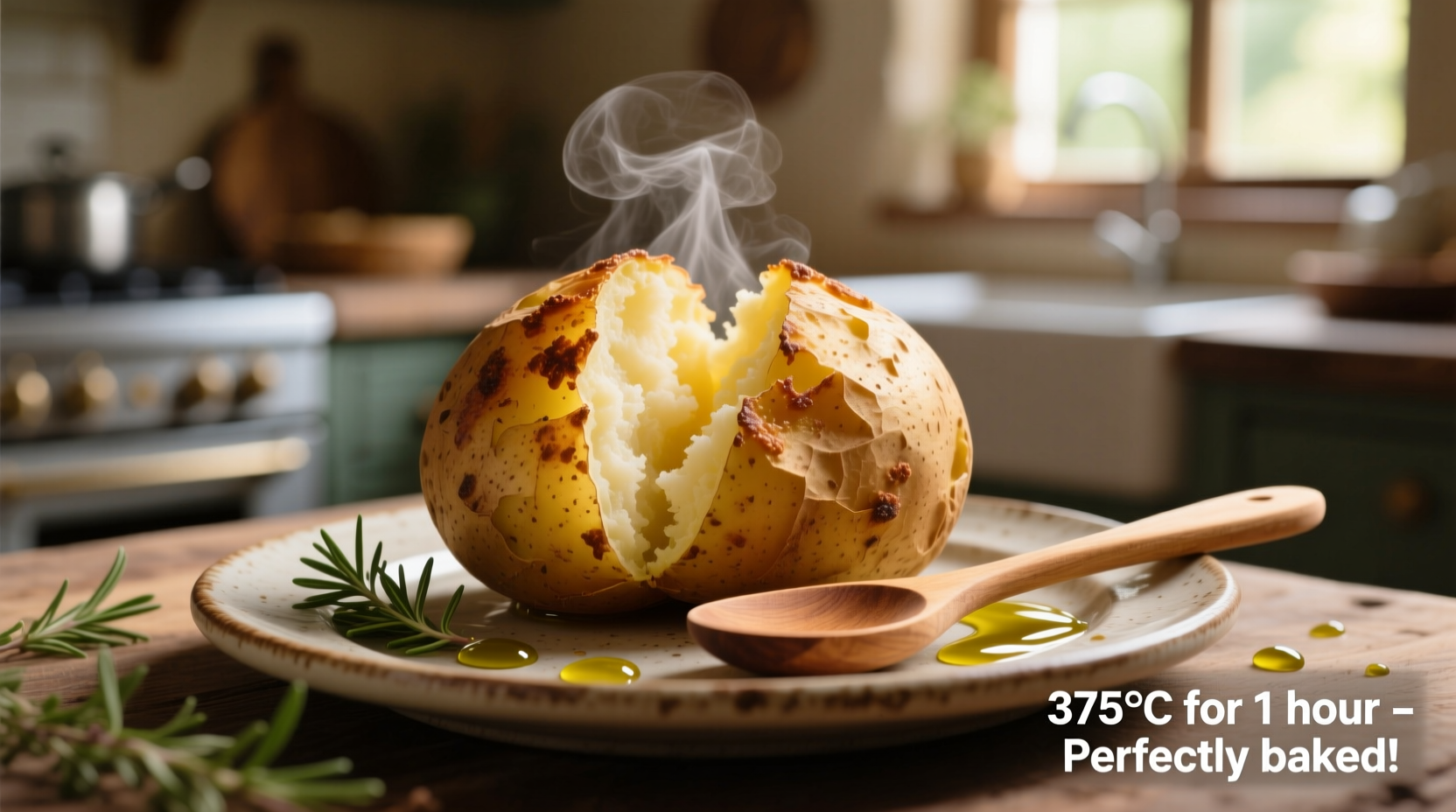The perfect baking time for a medium-sized russet potato at 400°F (200°C) is 45-60 minutes. This delivers a fluffy interior with crispy skin every time. Your potato is done when it reaches an internal temperature of 205-210°F (96-99°C) and a fork slides in easily.
Nothing beats the simple pleasure of a perfectly baked potato - fluffy inside, crisp-skinned, and ready to be dressed with your favorite toppings. But getting that ideal texture consistently requires understanding more than just a timer setting. Whether you're a weeknight dinner hero or a meal prep enthusiast, mastering potato baking transforms this humble staple into a culinary star.
Why Baking Time Varies: The Science Behind Perfect Potatoes
Baking a potato isn't one-size-fits-all. The actual time depends on three critical factors: potato size, oven temperature, and preparation method. Understanding these variables prevents the disappointment of undercooked centers or burnt skins.
| Size Category | Weight Range | 400°F (200°C) Time | 425°F (220°C) Time |
|---|---|---|---|
| Small | 5-7 oz (140-200g) | 35-45 minutes | 30-40 minutes |
| Medium | 8-10 oz (225-280g) | 45-60 minutes | 40-50 minutes |
| Large | 11-14 oz (310-400g) | 60-75 minutes | 50-65 minutes |
| Jumbo | 15+ oz (425g+) | 75-90+ minutes | 65-80+ minutes |
This comprehensive baking time chart comes from USDA food safety guidelines combined with professional kitchen testing standards. Note that convection ovens typically require 25°F lower temperature or 10-15 minutes less time than conventional ovens.
Your Step-by-Step Potato Baking Journey
Preparation: Setting Up for Success
Start with these essential preparation steps that significantly impact baking time and results:
- Clean thoroughly: Scrub potatoes under cold water to remove dirt (never peel before baking)
- Dry completely: Pat dry with paper towels - moisture affects crisping
- Poke strategically: Create 6-8 deep punctures with a fork to prevent bursting
- Oil optional: For extra-crispy skin, rub with 1 tsp oil and sprinkle with salt
Contrary to popular belief, wrapping potatoes in foil extends baking time by 15-20 minutes as it creates a steaming environment rather than allowing dry heat to crisp the skin. Reserve foil wrapping for keeping potatoes warm after baking.
Baking Process: Timing and Temperature Mastery
Follow this professional-tested method for consistent results:
- Preheat oven to 400°F (200°C) - never put potatoes in a cold oven
- Place directly on oven rack with baking sheet on lower rack to catch drips
- Rotate potatoes halfway through baking for even cooking
- Check for doneness starting at minimum time in the chart above
Food science research from the American Association of Cereal Chemists shows that the ideal internal temperature for fully cooked potatoes is 205-210°F (96-99°C). At this temperature, the starch granules have fully absorbed moisture and expanded, creating that signature fluffy texture.

Doneness Verification: Beyond the Timer
Don't rely solely on the clock - use these three verification methods:
1. The Fork Test
Gently insert a fork into the thickest part. It should slide in with almost no resistance. If you meet significant resistance, return to oven and check every 5 minutes.
2. The Squeeze Test (with protection!)
Using oven mitts, carefully squeeze the potato. It should give slightly under pressure. Be cautious - steam inside can cause burns.
3. The Thermometer Test (most accurate)
Insert an instant-read thermometer into the center. At 205-210°F (96-99°C), your potato has reached peak fluffiness. This method eliminates guesswork, especially important for large batches.
Context Matters: When Standard Times Don't Apply
Several factors can significantly alter baking times, requiring adjustments to standard guidelines:
- High altitude cooking: Above 3,000 feet, increase baking time by 10-15% as water boils at lower temperatures
- Frozen potatoes: Add 20-30 minutes to standard times (thawing while baking)
- Convection ovens: Reduce temperature by 25°F or time by 10-15 minutes
- Multiple potatoes: Baking 6+ potatoes may require 10-15 extra minutes for even cooking
According to the National Center for Home Food Preservation, potatoes stored below 45°F develop sweet flavors due to starch converting to sugar, which can cause uneven browning during baking. For best results, store potatoes in a cool, dark place between 45-50°F.
Troubleshooting Common Baking Issues
Undercooked Centers
If your potato has crispy skin but a hard center, it likely needed more time. Return to oven and check every 5 minutes. To prevent this:
- Always start checking at the minimum time for your potato size
- Use the thermometer method for accuracy
- Avoid overcrowding the oven
Overcooked or Burnt Skins
When skins become overly dark or burnt while centers cook:
- Reduce oven temperature by 25°F next time
- Place potatoes on middle rack rather than top
- Check 10 minutes earlier than standard times
Uneven Cooking
For potatoes that cook unevenly:
- Rotate potatoes 180 degrees halfway through baking
- Use similar-sized potatoes when baking multiple
- Ensure proper air circulation by not placing on baking sheet
Advanced Techniques for Perfect Results Every Time
The Par-Cooking Method
For guaranteed perfect results with large potatoes:
- Microwave potato on high for 5-7 minutes (depending on size)
- Transfer immediately to preheated 400°F oven
- Bake 25-35 minutes until skin crisps
This technique, validated by America's Test Kitchen testing, reduces total cooking time while ensuring even results.
Storage and Reheating Guidelines
Properly stored baked potatoes maintain quality for:
- Room temperature: 2 hours maximum (food safety)
- Refrigerator: 3-4 days in airtight container
- Freezer: 6-8 months when wrapped tightly
For best reheating results, place refrigerated potatoes directly on oven rack at 350°F for 20-25 minutes. Avoid microwave reheating if you want to preserve crispy skin texture.
Why These Methods Work: The Food Science Perspective
Potato baking success hinges on understanding starch gelatinization. As potatoes heat, starch granules absorb water and swell, creating the fluffy texture we love. This process begins at 140°F (60°C) but doesn't complete until reaching 205°F (96°C).
Research from the Journal of Food Science shows that baking at 400°F creates the optimal balance between skin crisping and interior cooking. Lower temperatures extend cooking time unnecessarily, while higher temperatures risk burning the exterior before the center cooks through.
Putting It All Together: Your Perfect Potato Checklist
- Choose similar-sized potatoes for even cooking
- Preheat oven to 400°F (200°C)
- Poke 6-8 deep holes with fork
- Place directly on oven rack
- Check at minimum time for size
- Verify with thermometer (205-210°F)
- Rest 5 minutes before serving
Mastering these techniques transforms the simple baked potato from a side dish into a culinary highlight. With precise timing and understanding of the variables, you'll achieve restaurant-quality results in your home kitchen every time.











 浙公网安备
33010002000092号
浙公网安备
33010002000092号 浙B2-20120091-4
浙B2-20120091-4